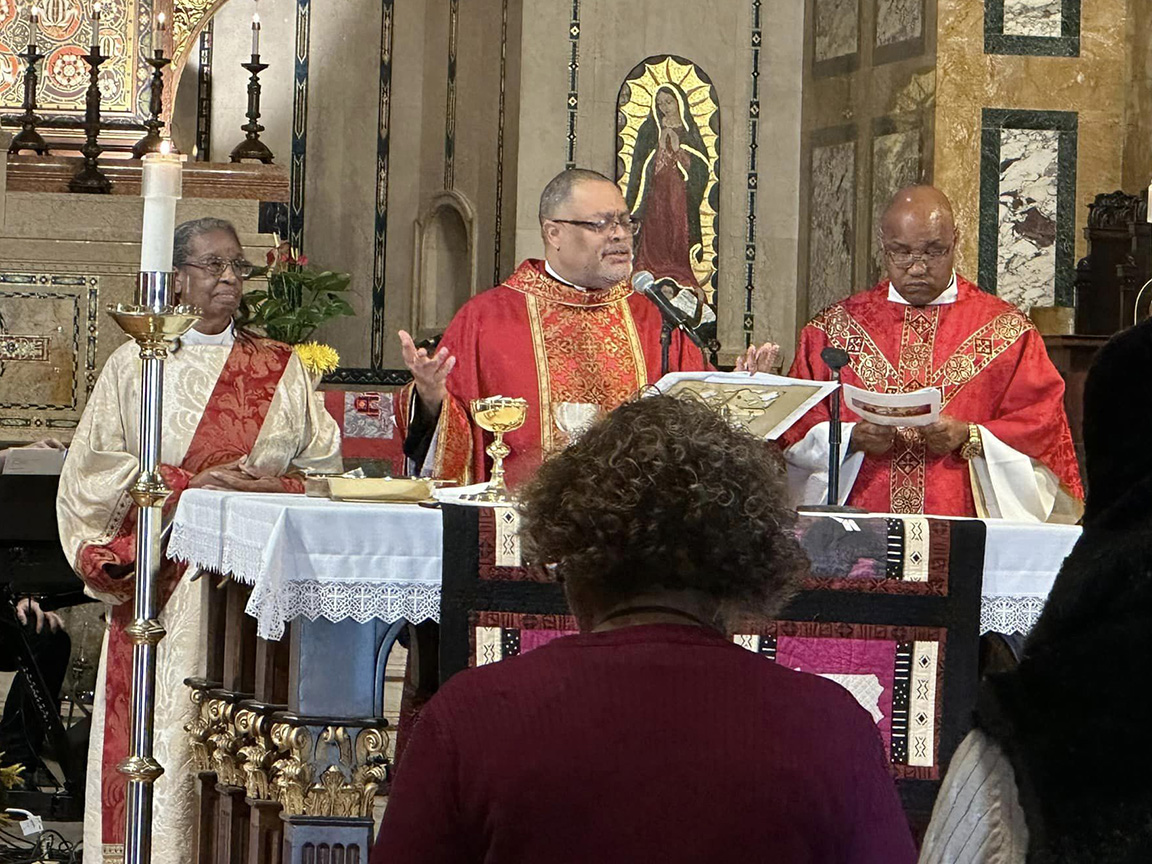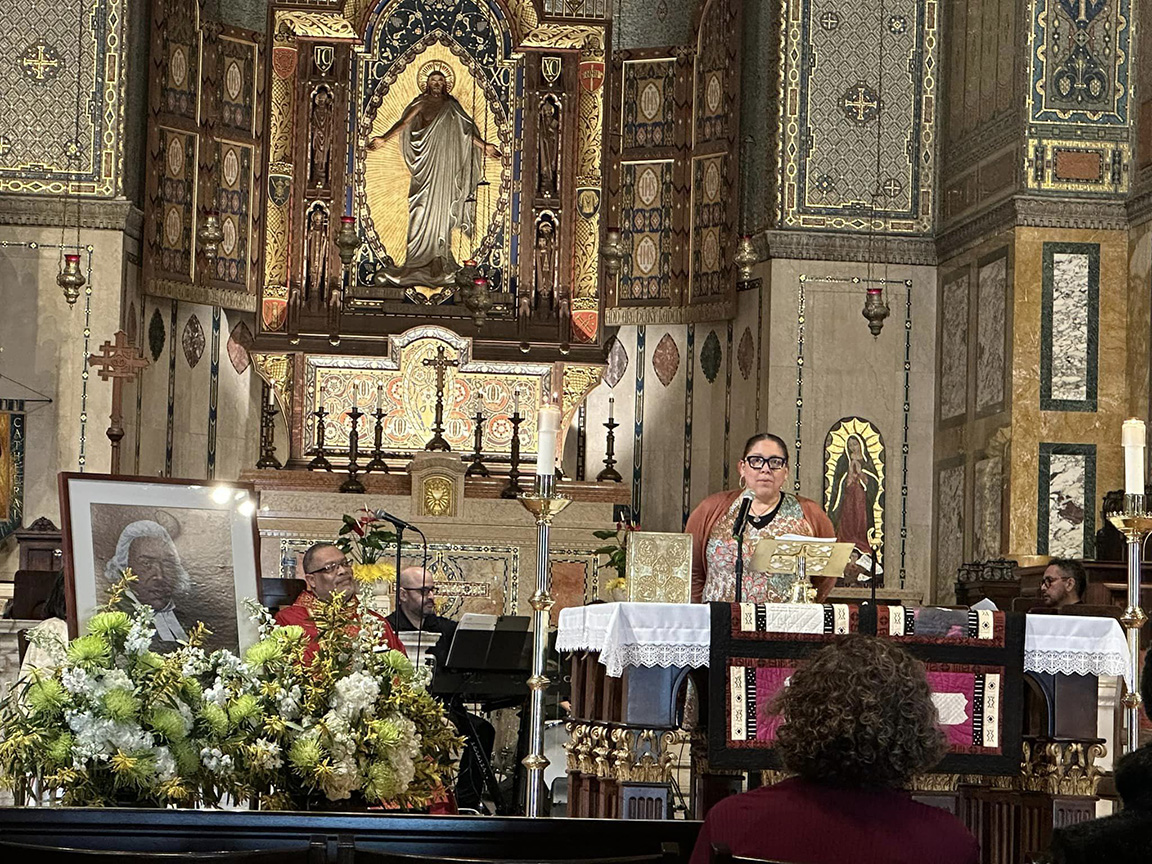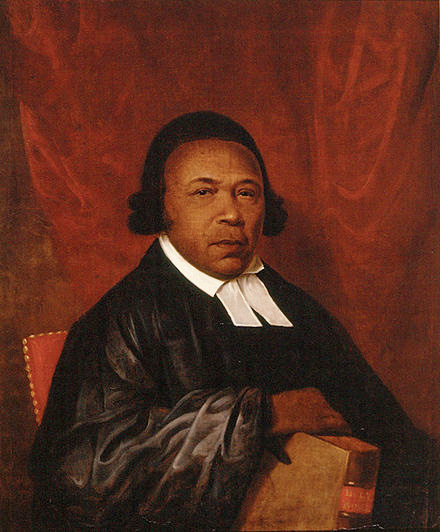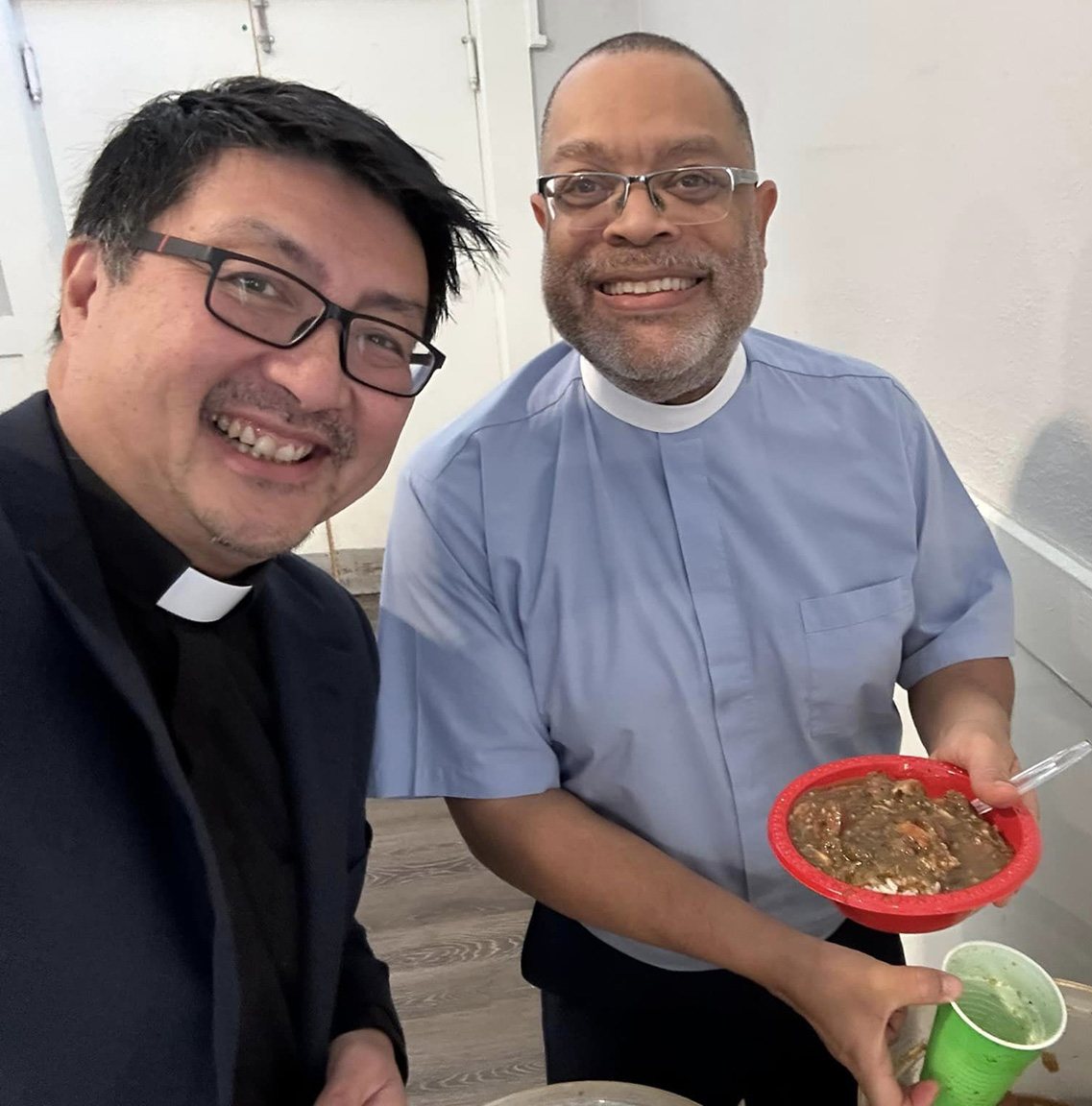
Jamie Hammons, left, and Joseph Oloimooja, right, assist as Guy Leemhuis celebrates Eucharist at St. John’s Cathedral in honor of Absalom Jones, first Black priest in The Episcopal Church. Photo: Suzanne Edwards-Acton
[The Episcopal News] As each name was called – Absalom Jones, Martin Luther King, Marcus Garvey, Malcolm X, Rosa Parks, Maya Angelou, Nat Turner, Harriet Tubman – a libation, a drop of water, was poured, signifying an ancestor acclaimed, a spirit welcomed, a trailblazer applauded in an ancient ritual performed at the Feb. 10 annual celebration of Jones, The Episcopal Church’s first African American priest, held at St. John’s Cathedral in Los Angeles.
“We thank you for all of our ancestors, for never letting us forget that we indeed are God’s people,” called out the Rev. Guy Leemhuis, vicar of St. Luke’s of the Mountains Church in La Crescenta, who presided over the celebration. “Thank you for all the activists in our midst and the activists who have come before us. We call them into the room.”
Leemhuis, president of the H. Belfield Hannibal – Los Angeles chapter of the Union of Black Episcopalians, and Canon Suzanne Edwards-Acton, co-chair of the diocesan Program Group on Black Ministries, welcomed worshippers, each expressing gratitude for their ongoing support of Black ministries and harambe gatherings throughout the diocese.
Upcoming events include a “Lenten Service of Lament, Hope and Call to Action for Black Lives,” to be held at 11 a.m. on Saturday, Feb. 17 at Christ the Good Shepherd Church, 3303 W. Vernon Avenue in Los Angeles; and a concert with the Adrian Dunn Singers at 3 p.m. on Sunday, Feb. 18 at St. Luke’s, La Crescenta, Leemhuis said.

Canon Suzanne Edwards-Acton recalls her mother’s stories of St. Thomas’ Church, Philadelphia, which was founded by Absalom Jones.
Harambe is a Swahili word meaning “all pull together’ and the gatherings are considered healing work from a legacy of segregation that resulted in creation of historically Black congregations, Edwards Acton has said previously.
“When I was growing up, my mom used to talk about Absalom Jones because he was part of the origin story and on the walls in the hallway of her church,” Edwards-Acton told the gathering, referring to the African Episcopal Church of St. Thomas, Philadelphia, founded in 1792 by Jones.
“My mom was raised at St. Thomas’ and my parents were married there,” said Edwards-Acton. “My cousins are still members and sing in the choir. As I grew up, I came to understand the significance of the Rev. Absalom Jones with the larger context of the wider Episcopal churches story.”
Leemhuis said, “It is important for people to know who Absalom was and what his movement and his experience was about in the church. Let us continue to experience Black church, not as a place, but an experience.”
The Rev. Joseph Oloimooja, priest-in-charge of Holy Faith Church in Inglewood, delivered an impassioned sermon, expanding on that history, and calling upon others to also “answer the call” as did Jones and, like him, also be trailblazers.
“Absalom Jones had a call on his life. We all have calls in our lives. Every one of us has callings,” he said.
Jones, in fact, answered several callings, first to love, but also to ordination, to the service of others, and to preaching, Oloimooja said.

Absalom Jones, first Black man to be ordained a priest in The Episcopal Church in the United States.
Born a slave in Delaware in 1746, Jones learned to read and write, and eventually was sent to Philadelphia where he worked as a clerk and handyman in a retail store. He was able to work for himself in the evenings and keep his earnings. He briefly attended a school run by Quakers where he learned mathematics and handwriting. In 1770, he married another slave, Mary Thomas, and purchased her freedom.
In 1784, he purchased his own freedom and along with a friend, Richard Allen, organized the Free African Society, a social, political, and humanitarian benevolent organization helping widows and orphans and assisting in sick relief and burial expenses. The two men became lay preachers at St. George’s Methodist Episcopal Church in Philadelphia.
Jones’ popularity led to an influx of new members, creating uneasiness among the Anglo congregation. As racial tensions flared, Jones and Allen left that church. Eventually, Allen formed Bethel African Methodist Episcopal Church, later named Mother Bethel AME Church, while Jones went on to join The Episcopal Church.
Oloimooja said the traditional slogan, ‘The Episcopal Church Welcomes You’ was true for Jones and remains true today, for “those who have been kicked out, left behind and who have been put aside because of what they believe, or how they look, or who they love. The Episcopal Church welcomes you.”
But founding the historic congregation was not the only call in Jones’ life, Oloimooja said. Jones answered affirmatively each time, as he received prophetic, pastoral and service calls, especially during the 1793 yellow fever epidemic when many left the city, but Jones stayed to support the sick and dying. Eventually Jones responded to the call to ordained ministry; first as a deacon and then as a priest.
“There are a lot of things we can learn from Absalom Jones. God is calling each one of us to love,” Oloimooja said, paraphrasing Jesus’ commandment; “If you love me, you will do something about it.”

Mel Soriano, assisting priest at St. John’s Cathedral, and Guy Leemhuis, vicar of St. Luke’s of-the-Mountains Church, La Crescenta, enjoy the soul food dinner following the service in honor of Absalom Jones. Photo: Suzanne Edwards-Acton
Quoting Episcopal Church Presiding Bishop Michael Curry, he added: “If it’s not about love, then it’s not about God, because God is love. That invitation, that calling is on your life. Can you answer that call to love, to love those who don’t love you, who don’t speak like you, who don’t look like you, who don’t think like you?”
He added: “God is inviting us to be of service to one another. Absalom Jones was a prophet, a priest, a pastor, and a server of people. You, too, have the call to serve, to serve your church, to serve your community, to serve the world. Absalom Jones showed us the way to serve. Can you answer that call to serve?”
A short clip of music from the service is here.
Bloy House, the Episcopal Theological School at Los Angeles, is offering online preaching classes for laity, beginning Feb. 15, Oloimooja said. “Can you say, yes, I will preach?”
“You can answer that call. These are all little reminders of the legacy of Absalom Jones, a call to love, a call to serve, a call to preach. Can you answer the call? Yes, you can.”
Leemhuis also requested contributions to the Hammons Fund for Black Seminarians, created by the Rev. Canon Jamesetta Hammons, retired deacon and UBE president emerita, to encourage and support Black seminarians as they pursue service and ministry.
The Episcopal Church also invites contributions to The Absalom Jones Fund for historically Black Episcopal colleges; Saint Augustine’s University in Raleigh, North Carolina, and Voorhees University in Denmark, South Carolina.
